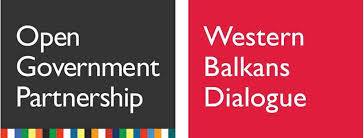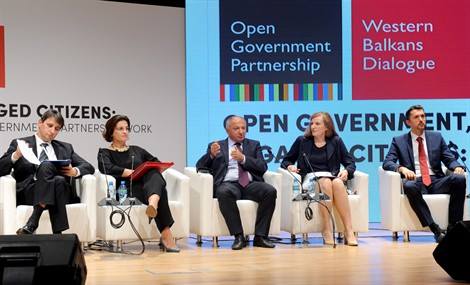


 The governments of the Western Balkans have come together on the occasion of the Western Balkans OGP Dialogue 2015, in Tirana, Albania, on September 10-11, 2015. The event gathered around 250 participants from Western Balkan countries (Albania, Bosnia – Herzegovina, Montenegro, Serbia, Macedonia, Kosovo) and beyond (UK, Croatia, Georgia, Poland etc.) representing both governments and civil societies.
The governments of the Western Balkans have come together on the occasion of the Western Balkans OGP Dialogue 2015, in Tirana, Albania, on September 10-11, 2015. The event gathered around 250 participants from Western Balkan countries (Albania, Bosnia – Herzegovina, Montenegro, Serbia, Macedonia, Kosovo) and beyond (UK, Croatia, Georgia, Poland etc.) representing both governments and civil societies.
It is quite remarkable that civil society organizations from Bosnia and Herzegovina, Kosovo, Montenegro, Macedonia, Serbia and Albania have managed to coordinate their work with governments, parliaments for the first time within the OGP framework. That’s what’s unique about OGP, it brings together engagement and action from governments and civil society alike.
Albania, Macedonia, Montenegro and Serbia are currently preparing and implementing their National Action Plans 2014- 2016. In June 2014, Kosovo made a commitment to join the OGP, and in September 2014 Bosnia and Herzegovina became the latest signatory country of the OGP. So, Western Balkans OGP Dialogue was an excellent opportunity for the Open Government movement in the Western Balkans countries and beyond.
 The Western Balkans OGP Dialogue agenda was designed to encourage participants to learn from others about effective efforts to strengthen open government and how to overcome problems rose during the process. OGP Balkan Dialogue invites governments and civil society organizations of OGP member countries that experience immigration or transition of refugees, to act upon that humanitarian and human rights crisis in the spirit of proactive openness. The event included sessions on priority topics: High-level political commitment to OGP and EU accession, open data, improving public services, safer communities, anti-corruption, open budgeting, legislative openness etc.
The Western Balkans OGP Dialogue agenda was designed to encourage participants to learn from others about effective efforts to strengthen open government and how to overcome problems rose during the process. OGP Balkan Dialogue invites governments and civil society organizations of OGP member countries that experience immigration or transition of refugees, to act upon that humanitarian and human rights crisis in the spirit of proactive openness. The event included sessions on priority topics: High-level political commitment to OGP and EU accession, open data, improving public services, safer communities, anti-corruption, open budgeting, legislative openness etc.
The main result of this conference was the establishment of a Regional Forum, whereby Governments and CSOs of the WB will have the opportunity to share experiences from their respective countries of how openness can improve public services, drive economic growth, reduce poverty and corruption, and restore public faith in government. The regional approach will serve to highlight good practices and successful initiatives, address the challenges faced, and establish regional support and peer-exchange mechanisms.